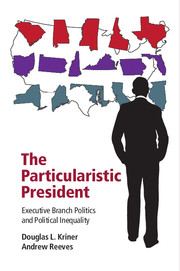Book contents
- Frontmatter
- Contents
- List of Tables
- List of Illustrations
- Acknowledgments
- 1 Introduction
- 2 The Origins of Presidential Particularism
- 3 Base Closings and Trade
- 4 Disaster Declarations and Transportation Grants
- 5 Federal Grants and Presidential Particularism
- 6 The Electoral Rewards of Presidential Particularism
- 7 Conclusion
- Appendix A Technical Appendix to Chapter 3
- Appendix B Technical Appendix to Chapter 4
- Appendix C Technical Appendix to Chapter 5
- Appendix D Technical Appendix to Chapter 6
- References
- Index
7 - Conclusion
Published online by Cambridge University Press: 05 June 2015
- Frontmatter
- Contents
- List of Tables
- List of Illustrations
- Acknowledgments
- 1 Introduction
- 2 The Origins of Presidential Particularism
- 3 Base Closings and Trade
- 4 Disaster Declarations and Transportation Grants
- 5 Federal Grants and Presidential Particularism
- 6 The Electoral Rewards of Presidential Particularism
- 7 Conclusion
- Appendix A Technical Appendix to Chapter 3
- Appendix B Technical Appendix to Chapter 4
- Appendix C Technical Appendix to Chapter 5
- Appendix D Technical Appendix to Chapter 6
- References
- Index
Summary
We have searched for and found evidence of presidential particularism in a diverse range of policy realms, from the implementation of U.S. trade law to decisions concerning military base closures to natural disaster declarations to the allocation of hundreds of billions of grant dollars across the country. Even in the realm of the federal government's response to natural disasters – a policy venue where presidents have unilateral authority and where all would hope that economic need alone drives policy choices – we found unambiguous evidence of presidents catering to swing states and privileging the interests of core political constituencies at the expense of a politically neutral distribution of federal resources. The sheer breadth of evidence for presidential particularism shows that it is far from the exception in presidential policymaking.
Given our findings of particularism across a range of policy areas, we suspect the influence of presidential particularism extends beyond the policies examined in this book. For example, election watchers have long noted that presidential candidates are reluctant to criticize federal ethanol subsidies, despite voluminous evidence of their inefficiencies and perverse unintended consequences. The rush to expand ethanol production has been linked to the destruction of pristine habitats and conservation lands, contamination of water supplies with fertilizers, and rising food prices, all while failing to reduce significantly the carbon footprint of energy generation. Why would presidents champion a position that, according to many, is detrimental to the best interest of the nation? One answer is particularism. Although Iowa is not always considered a swing state in general election contests, it enjoys privileged status as the nation's first caucus state in the presidential nomination calendar. Time and again Iowa's electoral importance has blunted any executive initiative to change the nation's energy policies. Indeed, executive branch policies under Presidents Bush and Obama have further bolstered ethanol, despite its widespread environmental and social costs.
Consider another policy venue – immigration – where President Obama's executive actions in 2013 directed the Department of Justice to, in effect, implement key provisions of the Development, Relief, and Education for Alien Minors Act, more commonly known as the DREAM Act.
- Type
- Chapter
- Information
- The Particularistic PresidentExecutive Branch Politics and Political Inequality, pp. 171 - 184Publisher: Cambridge University PressPrint publication year: 2015

